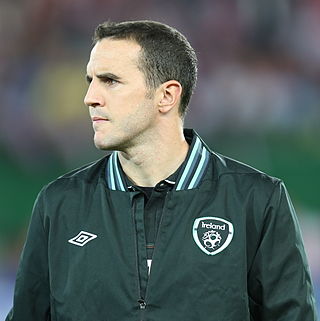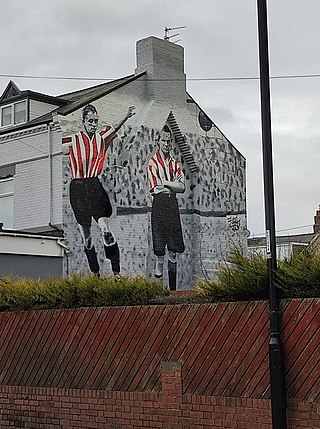
Christopher Roland Waddle is an English former professional football player and manager. He had a spell as Burnley manager during the 1997–98 season, but has not returned to coaching since. Largely since retiring he has worked in the media for BBC Radio 5 Live as part of their Premier League and Champions League team. He currently works as a commentator.

Sunderland Association Football Club is an English professional football club based in the city of Sunderland, Tyne and Wear. The team compete in the Championship, the second level of the English football league system.

John Francis O'Shea is an Irish professional football coach and former player. He was known for his versatility in playing several defensive and midfield positions on either side of the pitch or the centre. O'Shea spent the majority of his playing career at Manchester United, where he won five Premier League titles, one FA Cup, two Football League Cups, four FA Community Shields, the FIFA Club World Cup and the UEFA Champions League. He is one of the most decorated Irish footballers of all time, with only Denis Irwin, Roy Keane, Steve Heighway and Ronnie Whelan having accrued more honours. He is the current interim manager of the Republic of Ireland national football team.

Bobby Gurney was an English footballer who played as a forward. He is the highest goal scorer in the history of Sunderland.
John Morgan Oster is a football coach and former professional player who played as a midfielder.

Thomas William Smith is an English former professional footballer who played as a right winger or striker.
The 1975–76 season was the 96th season of competitive football in England.
The 1995–96 season was the 116th season of competitive football in England.
William Fagan was a Scottish footballer, who played for Celtic, Preston North End and Liverpool.
Stan Cummins is an English former footballer, who played as an attacking midfielder or forward.
The 1995–96 Football League season was the 97th completed season of The Football League. It was contested through three divisions, the First Division, Second Division and Third Division.
George Holley was an English professional footballer who spent most of his career as an inside forward with Sunderland, helping them claim the Football League title in 1913. He was also joint top scorer in the First Division in 1911–12 and represented England ten times, scoring eight goals.
Francis Cuggy was an English football player and coach. A right-half, he won the Football League championship with Sunderland in 1912–13 and made two appearances for England. He later coached Spanish club Celta Vigo.
Philip Bach was an English footballer who played at full back. He played his club football for various teams including Middlesbrough and Sunderland and made one appearance for England in 1899. He was later the chairman of Middlesbrough F.C. for a total of 18 years.
Henry Martin was an English professional footballer who played as an outside left for Sunderland, Nottingham Forest and Rochdale. At Sunderland he won the Football League title and reached the Cup Final in 1913. He made one appearance for England in 1914, and was later the manager at Mansfield Town.
Martin Harvey was a Northern Irish footballer who played for Sunderland and the Northern Ireland national football team as a wing half.
William John Hillman was an English football goalkeeper who played for Burnley, Everton, Dundee, Manchester City and Millwall.

Charles Austin is an English professional footballer who plays as a striker for League Two club Swindon Town.
The 1931–32 season was the 37th season of competitive football by Southampton, and the club's tenth in the Second Division of the Football League. After finishing in the top half of the Second Division league table for the past three seasons, the Saints struggled to challenge in 1931–32 and ended up finishing in 14th place, closer to relegation than promotion. Southampton's first season with manager George Kay started strongly, as the team picked up four wins in their first five matches and reached the top of the Second Division league table for the first time in the club's history. Form quickly deteriorated, however, and the club was briefly involved in a fight for survival in the new year. After picking up a few more wins, Southampton secured their safety and finished in 14th place with 14 wins, 14 draws and 14 losses.
Charlie Hurley – "the greatest centre half the world has ever seen" by Mark Metcalf, published by Sportsbooks in 2008.






